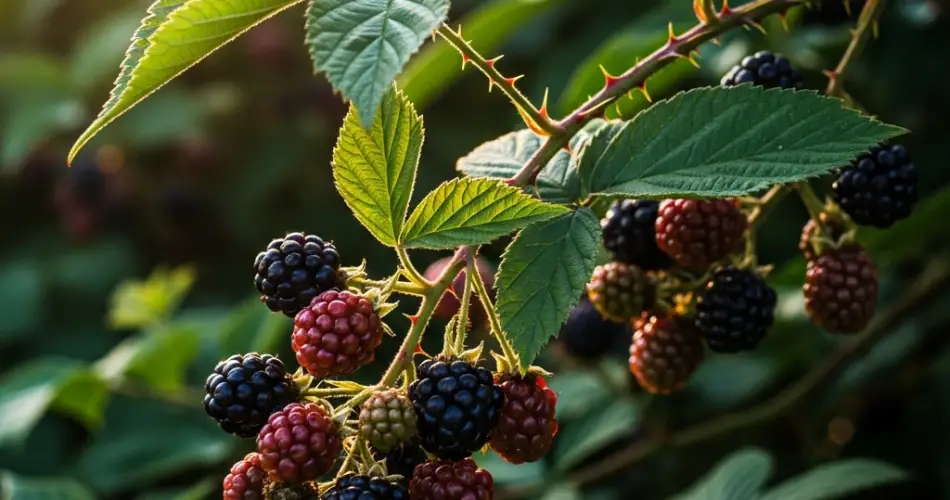Blackberries are a rewarding addition to any garden, offering sweet, juicy fruits during the summer months. However, if your blackberry plants are growing lush green foliage but failing to produce fruit, it can be both confusing and disappointing. Fortunately, most of the issues causing a lack of fruit can be resolved with a few simple adjustments to care and maintenance.
Here’s a comprehensive guide to why your blackberry plants may not be fruiting—and how to fix it naturally.
1. Understanding Blackberry Growth Habits
Before diving into troubleshooting, it’s important to understand how blackberry plants grow. Most common varieties are biennial, meaning the canes grow vegetatively in the first year (called primocanes) and produce fruit in the second year (as floricanes). After fruiting, those canes die back and should be pruned to make room for new growth.
Some modern cultivars, called primocane-fruiting blackberries, can fruit on first-year canes later in the season. Knowing which type you’re growing is crucial to proper care and expectations.
2. Young Plants May Need More Time
If your blackberry plant is still in its first or second year, don’t worry if it hasn’t fruited yet. Many blackberry varieties won’t begin producing a meaningful harvest until their second or third growing season. In the meantime, focus on building strong root systems and healthy cane development.
3. Pruning Problems
Incorrect or missed pruning is one of the most common reasons blackberries fail to produce fruit. For traditional biennial varieties:
-
Remove old floricanes after they finish fruiting. These will not produce again and can crowd new growth.
-
Thin primocanes during the growing season to encourage better airflow and light penetration.
-
Tip the canes when they reach about 3 to 4 feet tall to encourage branching, which results in more fruiting sites the following year.
For primocane-fruiting varieties, prune all canes to the ground in late winter or early spring to allow fresh growth that will bear fruit later in the same season.
4. Lack of Sunlight
Blackberries are sun-loving plants and require at least 6 to 8 hours of full sunlight daily to produce fruit. Without enough light, they may grow healthy-looking leaves and canes but won’t set fruit.
Make sure your blackberries aren’t shaded by buildings, trees, or other plants. If they are, consider relocating them or trimming back nearby vegetation to allow more sun exposure.
5. Poor Pollination
Even though blackberries are self-pollinating, poor pollination can result in few or misshapen fruits. Pollination depends on healthy flowers and active pollinators like bees and butterflies.
To encourage natural pollination:
-
Avoid pesticide use, especially during flowering season.
-
Plant pollinator-friendly flowers nearby (like lavender, borage, or calendula).
-
Water moderately; overwatering during flowering can reduce pollen viability.
6. Over-Fertilizing with Nitrogen
While nitrogen helps promote leafy growth, too much of it can lead to an overabundance of foliage at the expense of flowering and fruiting. This is especially common when using general-purpose synthetic fertilizers or high-nitrogen composts.
Switch to a balanced or low-nitrogen organic fertilizer during the growing season. Compost, fish emulsion, or seaweed-based feeds are excellent natural choices. Apply these in moderation and avoid feeding late in the season, which can encourage late-season growth rather than fruit set.
7. Soil Issues
Blackberries prefer well-drained, slightly acidic to neutral soil (pH 5.5 to 7.0). Poor drainage, compacted soil, or a nutrient imbalance can hinder root development and reduce fruiting potential.
To improve soil naturally:
-
Add organic compost to enhance drainage and fertility.
-
Mulch with straw, wood chips, or leaf mold to retain moisture and feed the soil over time.
-
Conduct a soil test to determine pH and nutrient levels. Adjust as needed with natural amendments like sulfur (to lower pH) or lime (to raise pH).
8. Watering Inconsistencies
Consistent watering is vital for blackberry plants, especially when canes are developing and flowers are forming. Irregular watering can stress the plant, resulting in flower drop or small, dry berries.
Aim to provide about 1 to 2 inches of water per week, either from rainfall or supplemental irrigation. Water deeply and evenly, especially during dry spells.
9. Pest or Disease Stress
Pests like aphids, spider mites, or Japanese beetles can stress the plant and impact its ability to fruit. Fungal diseases like rust or cane blight can also damage fruit-bearing stems.
To protect plants naturally:
-
Keep the area around the base clear of weeds and debris.
-
Use neem oil or insecticidal soap if pests become a problem.
-
Ensure proper spacing and airflow between canes to reduce fungal issues.
10. Plant Age and Decline
Even the healthiest blackberry plant can start to decline after 10–15 years. If your plant is older and yields are dropping despite proper care, it may be time to start fresh with new stock.
Consider propagating new plants from tip layering or root divisions if your current variety has been productive in the past.
Final Thoughts
Blackberries can be incredibly productive when given the right conditions. If your plants aren’t fruiting, it’s usually due to one or a combination of factors like improper pruning, too much nitrogen, insufficient sunlight, or young plant age. By addressing these issues with natural techniques and consistent care, you’ll encourage your blackberry plants to thrive and reward you with a bountiful harvest year after year.



